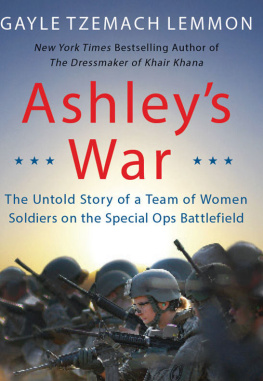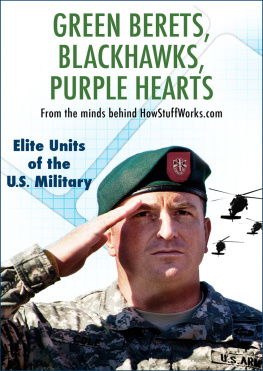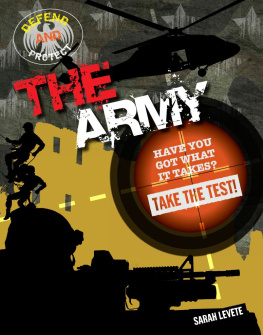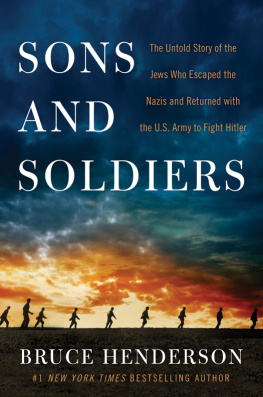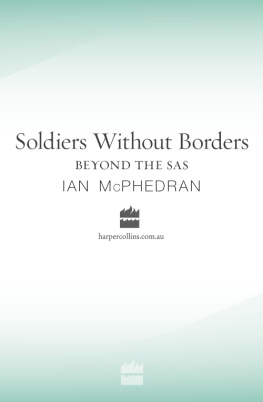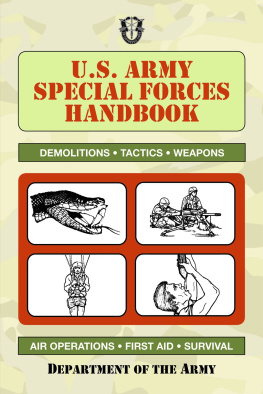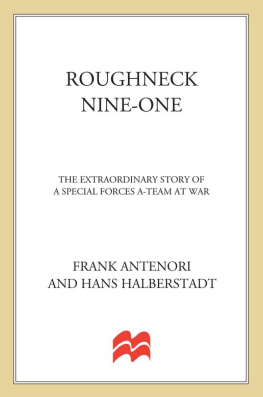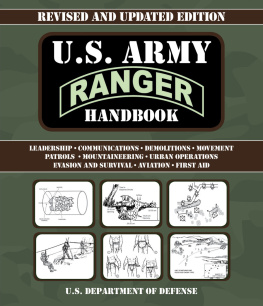
To all the unsung warriors. That you may never be forgotten.
To Rhoda Spielman Tzemach and Frances Spielman.
And to JL, who believed from the start.
Contents
Guide
T his book is the product of twenty months of travel, hundreds of hours of interviews conducted in a dozen states across America, a review of primary research and documents, and an illuminating set of conversations with some of Americas most seasoned military leaders.
It also has been a puzzle to assemble, a privilege to tell, and a humbling responsibility to bring to life.
What follows is a ground-level view of the women who answered the call to serve with Special Operations Forces, soldiers who raised their hands right away when they heard of the chance to volunteer with the best in battle. Readers seeking to learn more about military tactics, decision making, and the formulation of military strategy will find several suggestions in the select bibliography that follows these pages.
Most names have been changed to protect those involved and those still connected to the special operations community. Some details have been omitted for the sake of security.
I had the privilege of meeting many men and women not mentioned in these pages. Each one had a story worth telling.
The soldiers who spoke with me shared their war stories not because they wish to be knownthey do notbut because they want their friend and teammate to be remembered.
The stories are theirs. Any errors are mine.
At a time when the divide between those who volunteer to fight Americas wars and those who never served is wide and growing, it is more important than ever to know who these soldiers are and why they sign up to fight for the sake of the rest of us.
Whatever any of these soldiers do in the future, this past year has convinced me that nothing, ever, will come close to the year they spent serving on the battlefield alongside the men of Americas Special Operations Forces.
And no passage of years will lessen their sense of belonging to CST-2.
| DFAC | Dining facility |
| JOC | Joint Operations Center |
| JSOC | Joint Special Operations Command, based in Fayetteville, North Carolina |
| KAF | Kandahar Airfield |
| MP | Military Police |
| MREs | Meals, Ready to Eat |
| SF | Special Forces: the Green Berets |
| SOCOM | Special Operations Command, based in Tampa, Florida |
| SOF | Special Operations Forces, this includes Delta Force, Green Berets, Navy SEALs, 75th Ranger Regiment, Air Force Special Operations Command, Marine Corps Forces Special Operations Command |
| TOC | Tactical Operations Center |
| XO | Executive officer, the second in command in certain military units |
S econd Lieutenant White entered the ready room and began preparing for the night of battle.
Kandahar, August 2011, 2200 hours : a narrow room just off a main hallway, lined with plywood shelves and plastic drawers stuffed with rolls of Velcro, electrical cables, and heavy-duty packing tape. The smell of gun oil clung to the air. White had written down the long list of gear, and now calmly grabbed items the mission required:
Helmet and night vision goggles. Check.
Headset for communicating with platoon leader. Check.
M4 rifle. Check.
M9 pistol. Check.
Ammunition for both. Check, check.
Eye protection to keep dust and dirt from causing sudden blindness. Check.
Notecards and pens to document everything that was said and found. Check.
Clif Bars in case the mission went long. Check.
Jolly Ranchers and Tootsie Rolls for village kids. Check.
Tourniquets to stop the bleeding of a fellow soldier. Check.
Medical gloves.
Zip ties.
Water.
Check. Check. Check.
White felt the fear rising, but more seasoned soldiers had provided plenty of advice for the special brand of trepidation that accompanies a soldier on their first night mission. It gets easier after the first time, they assured the newbies during training. Dont indulge it, just pass through it.
Ready now, White stepped into the briefing room and took in the scene. Dozens of battle-hardened men from one of the Armys fittest and finest teams, the elite special operations 75th Ranger Regiment, crowded in to watch a PowerPoint presentation in a large conference room. Many had Purple Hearts and deployments that reached into the double digits. Around them was the staff that supports soldiers in the field with intelligence, communications, and explosives disposal capabilities. Everyone was studying a diagram of the target compound as the commanders ticked through the mission plan in their own vernacular, a mix of Army shorthand and abbreviations that, to the uninitiated, sounded like a foreign language. But every person in the room knew precisely where they needed to be, what their role was, and how they would help accomplish the nights mission.
White had the feeling of being in a Hollywood war movie. Standing nearby was a noncommissioned officer (NCO) and Iraq War veteran whom the second lieutenant had trained with.
Are we supposed to say something? White asked
Staff Sergeant Mason, also out for the first time, scooted closer and whispered back. Neither new arrival wanted to stand out any more than they already did.
No, I dont think so, not tonight. The last group will speak for us.
That was a relief. White had no desire to draw attention in a room filled with soldiers who clearly felt at home in combat. Like a cast of actors who had performed the same play for a decade, they knew each others lines and moves, and offstage they knew each others backstories. It was an unexpected revelation for White, gleaned during a fifteen-minute mission review in a makeshift conference room in the middle of one of Afghanistans most dangerous provinces: this was a family unit. A brotherhood.
The briefing ended, the commanding officer approached the front of the room and the soldiers suddenly shouted as one:
Rangers Lead the Way!
They saluted in a finely choreographed sweep and filed out.
The rookie second lieutenant did the same, hoping the gesture didnt look too awkward for a first-timer, then followed the others, trailed by Sergeant Mason. They stepped into their officea broom closet, actuallyand exhaled for the first time.
Whew, White allowed.
That shit is serious, Mason said. This is the real deal.
Then, without another word, they began a systems check, testing the frequency of their radios to make sure they operated properly. This would be their lifeline while on mission. They triple-checked their night-vision goggles, which clipped onto the top of their helmets, and made sure they had batteries for all the electronics they carried: headsets, radios, and a red laser that allowed them to silently point things out to one another. By the time they exited the barracks each was carrying close to fifty pounds of gear.
In one of the many Velcroed pockets of Whites uniform was information about the insurgent they were after and a list of crimes he was suspected of committing. In another pocket was a medal of St. Joseph and a prayer card. White stepped out of the barracks and worked to conceal any trace of the intense emotions this moment conjured up: pride in being part of a team hunting a terrorist who was killing American soldiers and his own countrymen; trepidation at the thought that after a short ride on the bird they would all end up in his living room. But it was exactly what White had wanted and trained for: to serve with fellow soldiers in this long war and do something that mattered.
Next page
